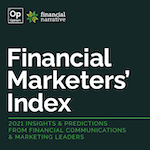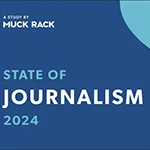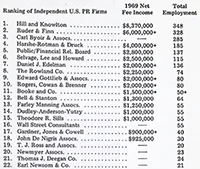 |
COVID is no longer the biggest concern for marketing and communication execs in the financial services sector, according to a survey from Financial Narrative, a network of financial marketers and strategic insight agency Opinium.
The online survey found that for 30 percent of respondents, “changing the imaging/positioning of our company” was a major driver of marcom efforts this year (down two percent from last year’s survey). But the importance of “pivoting strategies due to COVID” slid much further as a top concern, going from 37 percent in 2020’s study to 28 percent in 2021.
The shift away from focusing mainly on COVID is part of what the survey refers to as “business-as-usual plus”—a term that adds communicating about such areas as brand purpose, social impact and ESG to the mix.
Marketing budgets and team sizes are continuing on an upward path, the survey respondents say. More than four in ten (41 percent) said that 2021 marketing budgets increased from 2020, with 63 percent reporting that headcount on marketing teams had increased.
Things were slightly less bullish for communications teams, with 23 percent reporting a hike in budgets and 35 percent adding members.
Adding to marketing and communications teams, however, has gotten more complicated. One chief marketing officer reported a “shortage of skilled and experienced talent in the market,” an opinion shared by more than half (55 percent) of survey respondents.
Holding on to existing team members is also a challenge. Nearly a third (29 percent) say they are struggling to retain employees, with 26 percent currently trying to hire replacements for those who have left.
The most in-demand job skills are digital marketing (cited by 39 percent of respondents), quantitative analytics (26 percent), external communications and marketing strategy (both at 11 percent).
When it comes to what will bring in new employees and keep those already there, flexible work schedules and growth opportunities are big draws. But there was a gender divide as regards the appeal of each. More than nine in 10 (91 percent) women said flexible working was important, a number that dipped to 63 percent for men. Men were more likely to cite growth opportunities, with 81 percent noting their importance, while only 68 percent of women did.
As regards where communicators need to place their focus in the future, several key areas stood out. Trustworthiness, promoting a company’s value proposition, social image initiatives and ESG are seen as likely to increase in importance.
“A new marketing communications framework is evolving where financial services brands are braver about not just identifying and talking about purpose, but building audience-led campaigns on that purpose that drive real change,” said Vested UK CEO Elspeth Rockwell, a member of the Financial Narrative board.
The Financial Marketers’ Index surveyed 105 financial services marketing and communications CMOs, CCOs, department heads, VPs and directors between July 16 and September 1.


 Brand has a powerful effect on a company’s valuation, but the level of brand understanding in the investment community leaves a lot to be desired, according to a new study from Brodeur Partners, Interbrand and NewtonX.
Brand has a powerful effect on a company’s valuation, but the level of brand understanding in the investment community leaves a lot to be desired, according to a new study from Brodeur Partners, Interbrand and NewtonX. AI may still be viewed with a wary eye by most media pros, but its use is growing, according to a new study from Muck Rack.
AI may still be viewed with a wary eye by most media pros, but its use is growing, according to a new study from Muck Rack. A new study from Walker Sands says that some marketers have been putting the cart before the horse when it comes to the relationship between marketing channels and business outcomes.
A new study from Walker Sands says that some marketers have been putting the cart before the horse when it comes to the relationship between marketing channels and business outcomes. Thought leadership can make made B2B brands more "powerful and attractive to buyers," according to Edelman report.
Thought leadership can make made B2B brands more "powerful and attractive to buyers," according to Edelman report. The deadline for O'Dwyer's 2024 rankings of PR firms, a benchmark study of the growth of the industry annually since 1970, is Mon., Mar. 11, 2024.
The deadline for O'Dwyer's 2024 rankings of PR firms, a benchmark study of the growth of the industry annually since 1970, is Mon., Mar. 11, 2024.


 Have a comment? Send it to
Have a comment? Send it to 
No comments have been submitted for this story yet.